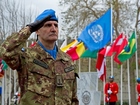Spotlight
President Michel Suleiman said he informed the delegation visiting Australia with him that the government will draft a law that would allow Lebanese expatriates to vote in the parliamentary elections.
In remarks to reporters accompanying him in his trip, Suleiman said the expats are an added value for Lebanon.
 Full Story
Full Story
UNIFIL commander Maj. Gen. Paolo Serra said the continued Israeli occupation of the Lebanese side of the border village of Ghajar has political reasons.
In remarks to al-Joumhouria newspaper on Wednesday, Serra said: “The problem of Ghajar is political more than military.”
 Full Story
Full Story
March 14 opposition MPs resumed Wednesday their attack on the government on the second day of a three-day parliamentary session, which will witness statements by 53 more lawmakers.
Lebanese Forces MP Antoine Abou Khater accused the cabinet of corruption, reiterating that it was formed through a coup against ex-Premier Saad Hariri’s former government last year.
 Full Story
Full Story
Lebanese authorities have refused to allow U.N. observers to land in the defunct Qulaiat airport in the North to give them quick access to the Syrian province of Homs, An Nahar daily reported Wednesday.
The newspaper said the U.N. made the request given that the airport is at close proximity to Homs and could be used for the possible evacuation of casualties.
 Full Story
Full Story
The transportation sector on Tuesday seemed inclined to postpone a strike scheduled for Thursday, following a meeting between a syndical delegation and Prime Minister Najib Miqati.
Radio Voice of Lebanon (100.3-100.5) reported that “the demands were put on the agenda of the cabinet session that will be held on Friday.”
 Full Story
Full Story
The Phalange Party said on Tuesday that it was unfortunate that a dispute erupted between Prime Minister Najib Miqati and Finance Minister Mohammed al-Safadi, saying that whoever occupies those two positions should enjoy complete accord.
It said in a statement after its weekly politburo meeting: “The dispute is a sign of a future disputes within the government, which will have catastrophic consequences on Lebanon.”
 Full Story
Full Story
U.S. Army Central Command (ARCENT) Commander Lieutenant General Vincent K. Brooks stressed on Tuesday the role of the army as Lebanon’s “sole legitimate defense force in the country,” announced the U.S. Embassy in a statement.
He reiterated the U.S. military’s ongoing support in “strengthening the professional capacity of the Lebanese Armed Forces to serve the Lebanese people as the sole legitimate defense force to secure Lebanon’s borders and defend the sovereignty and independence of the state.”
 Full Story
Full Story
WikiLeaks founder Julian Assange interviewed Hizbullah chief Sayyed Hassan Nasrallah on Tuesday in the debut of his "The World Tomorrow" talk show on Russia's state-funded RT cable broadcaster.
Assange remains under house arrest and was speaking from his study in London to Nasrallah at his Lebanese office via a computer video link.
 Full Story
Full Story
President Michel Suleiman noted on Tuesday the social diversity in Lebanon and Australia, adding that the challenges faced in the world require solutions that “go beyond national limits.”
He said: “Diversity cannot survive without dialogue, moderation, and partnership.”
 Full Story
Full Story
U.N. Special Coordinator for Lebanon Derek Plumbly visited on Tuesday the northern area of Akkar where he met displaced Syrian families and held meetings with Lebanese army representatives.
In a statement he delivered during his visit, Plumbly said the impact of the Syrian crisis is probably most acute in northern Lebanon because of the proximity to the Syrian border and because of the displacement of Syrians.
 Full Story
Full Story




